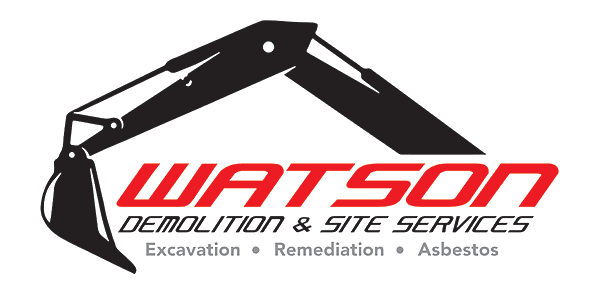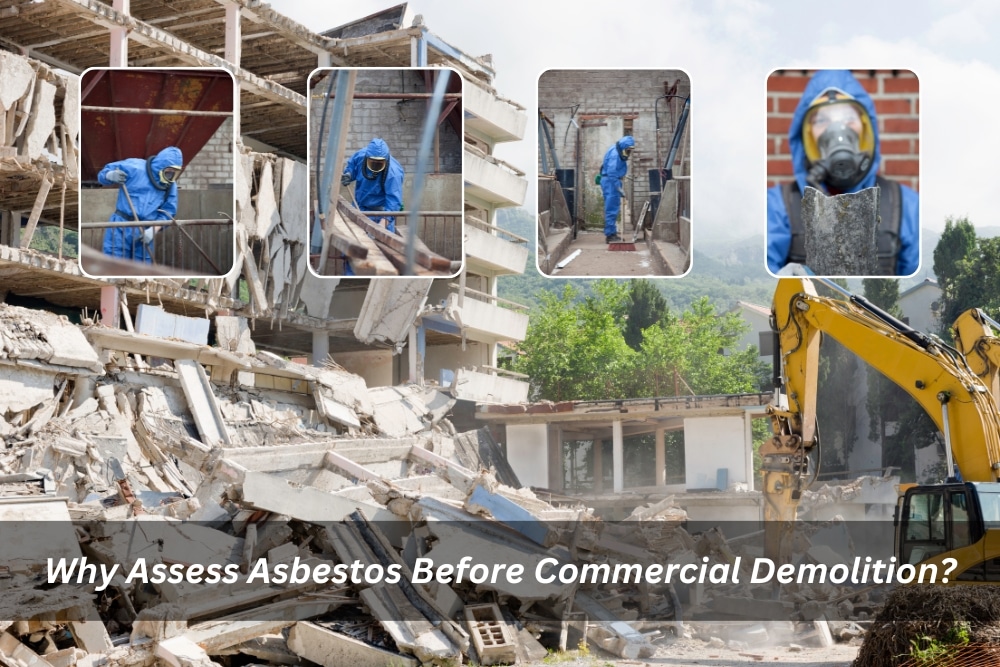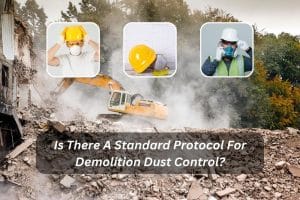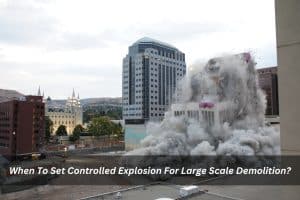Conducting asbestos testing is an integral aspect of commercial demolition, involving intricate planning and precise execution. Whether you’re a business owner or property manager, it’s imperative to grasp the potential hazards linked to asbestos in your building before embarking on any demolition venture. In this article, we’ll explore why the assessment of asbestos through testing before commercial demolition is not only a legal obligation but also an essential measure in guaranteeing the well-being of workers and the surrounding environment.
Do you need asbestos testing before demolition?
The short answer is a resounding “yes.” Asbestos testing is a crucial step in the demolition process, ensuring the safety of workers, the environment, and the surrounding community. Here, we’ll explore why assessing asbestos before commercial demolition is vital and the steps involved in this essential process.
Why is it important to evaluate asbestos before conducting commercial demolition?
Before we delve into the specifics of asbestos testing, it’s crucial to understand why this evaluation is so essential before commercial demolition. Asbestos is a naturally occurring mineral that was extensively used in construction materials like insulation, roofing, and floor tiles until its health risks were discovered. When these materials are disturbed during demolition, the asbestos fibres can become airborne, creating a hazardous environment.
The health risks associated with asbestos exposure are significant. Moreover, asbestos-related diseases often have a long latency period, meaning symptoms may not manifest for decades after exposure. Therefore, evaluating asbestos before demolition is critical to protect both the people working on the project and the broader community.
What are the risks of asbestos exposure during demolition?
Asbestos exposure during demolition can lead to severe health consequences for those involved and even for nearby residents. The risks include:
- Respiratory diseases: Inhaling asbestos fibres can lead to respiratory diseases like asbestosis, a chronic lung condition, and mesothelioma, a rare and aggressive cancer. The effects are often irreversible and can take years to manifest.
- Healthcare costs: Treating asbestos-related diseases can be expensive, not only for individuals but also for healthcare systems. The burden on healthcare infrastructure is an additional reason to prioritise asbestos testing.
- Legal implications: Ignoring asbestos risks during demolition can result in legal liabilities, potentially leading to lawsuits and financial repercussions.
- Environmental impact: Asbestos contamination can extend beyond the demolition site, affecting the environment and water sources. This can result in ecological damage and further costs for cleanup.
How can inspection for asbestos help to protect you and your workers?
Asbestos testing is a vital tool for protecting the health and safety of workers, as well as the broader community. Here are some ways it contributes to a safer demolition process:
- Identification: Asbestos testing identifies the presence and location of asbestos-containing materials (ACMs) within the building. This knowledge allows for careful planning and containment of ACMs during demolition.
- Proper handling: Armed with the information from asbestos testing, workers can take necessary precautions when handling ACMs, reducing the risk of fibre release.
- Minimising exposure: With asbestos testing, it is possible to minimise the spread of asbestos fibres during demolition, thus reducing the risk of exposure to workers and nearby residents.
- Regulatory compliance: Many regions have strict regulations regarding asbestos handling and disposal. Asbestos testing ensures compliance with these regulations, preventing legal complications.
What are the steps involved in inspection for asbestos before demolition?
Asbestos testing involves a series of steps to identify and assess the presence of asbestos-containing materials. Here’s an overview of the process:
- Site inspection: A trained asbestos professional conducts a thorough site inspection to identify potential ACMs. This may include sampling suspect materials for laboratory analysis.
- Laboratory analysis: Samples collected during the site inspection are sent to a certified laboratory for analysis. The lab will determine if asbestos is present and, if so, its type and quantity.
- Risk assessment: Based on the laboratory results, a risk assessment is performed. This involves evaluating the condition of ACMs and the potential for fibre release during demolition.
- Management plan: A comprehensive management plan is formulated, delineating the safe removal, containment, or management of asbestos-containing materials (ACMs) during demolition, ensuring that asbestos can be fully removed. This plan encompasses safety measures for workers and strategies for environmental protection.
- Regulatory compliance: The asbestos testing process ensures compliance with local, state, and federal regulations. Permits and notifications may be required, and the process must adhere to these legal requirements.
- Safe demolition: Armed with the information from asbestos testing, the demolition can proceed with a focus on minimising asbestos exposure risks.
How much does asbestos testing cost?
The cost of asbestos testing can vary depending on several factors, including the size and complexity of the building, the number of samples needed, and your location. Generally, asbestos testing costs can range from a few hundred to a few thousand dollars. It’s essential to consider this cost as an investment in safety and compliance rather than an unnecessary expense. Failing to assess asbestos risks can lead to much higher costs in terms of health, legal, and environmental repercussions.
Where can you find a reputable demolition company with expertise in asbestos testing?
Finding a reputable demolition company with expertise in asbestos testing is a crucial step in ensuring a safe and compliant demolition process. Here are some tips on how to locate the right professionals for the job:
- Research: Start by conducting online research and seeking recommendations from industry peers, regulatory agencies, or environmental consultants. Look for companies with a proven track record in asbestos testing and removal.
- Certifications: Verify that the demolition company and its staff hold the necessary certifications and licenses for asbestos testing and removal. This includes accreditation from relevant organizations and compliance with local regulations.
- References: Ask for references and check the company’s portfolio to see if they have experience with similar projects. Contact previous clients to inquire about their satisfaction with the company’s services.
- Transparent pricing: Request detailed quotes and pricing information from multiple companies. Be wary of companies that offer significantly lower prices than their competitors, as this may indicate subpar services.
- Insurance: Ensure the company has appropriate liability insurance and workers’ compensation coverage. This protects you from potential liabilities in case of accidents or asbestos-related issues during demolition.
- Communication: Effective communication is key. Choose a responsive company, that listens to your needs, and provides clear explanations of its processes and procedures.
- Environmental practices: A reputable demolition company should have environmentally friendly practices in place. Inquire about their approach to asbestos disposal and overall commitment to sustainability.
Conclusion
In conclusion, assessing asbestos before commercial demolition is not an optional step but a critical one. It safeguards the health of workers and the surrounding community, minimizes legal risks, and ensures compliance with environmental regulations. Asbestos testing, although it comes with a cost, is a sound investment in safety and peace of mind. When looking for a demolition company, prioritize expertise in asbestos testing, certifications, transparency, and a commitment to responsible environmental practices. By doing so, you can ensure a successful and safe demolition project that paves the way for the exciting future of your site.
For a seamless and secure demolition process, trust Watson Demolition & Site Services to handle all your asbestos testing and demolition needs. With our team of certified professionals and years of experience in the field, we guarantee a meticulous assessment of any asbestos-containing materials, ensuring the safety of your workers and the surrounding environment. Our comprehensive approach to commercial demolition encompasses careful planning, precise execution, and adherence to all necessary safety protocols. Don’t compromise on the well-being of your workforce or the community—choose Watson Demolition & Site Services for a reliable, efficient, and compliant demolition solution. Get in touch with us today to discuss your project requirements and benefit from our expert services.



